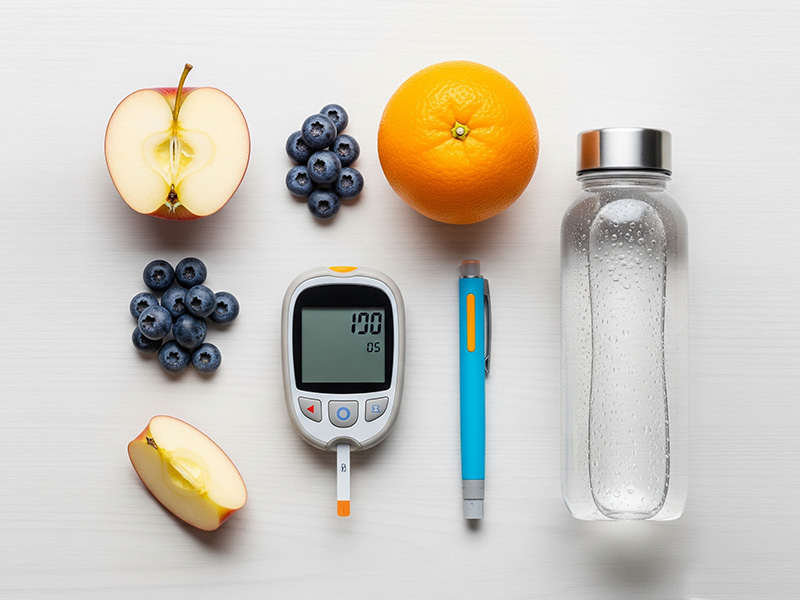Diabetes affects over 537 million people worldwide, with projections estimating 643 million cases by 2030. Whether you have type 1, type 2, or gestational diabetes, effective daily management is key to maintaining a high quality of life and preventing complications.
This article provides practical, evidence-based tips to help you navigate diabetes with confidence. From diet and exercise to monitoring and mental health, we’ll cover actionable steps to keep your blood sugar in check. We’ll also touch on how technology, like continuous glucose monitors, is transforming care—see our related post on How AI and Wearable Tech Are Transforming Modern Healthcare. For insights on related conditions, explore Understanding Hypertension: Causes, Symptoms, and the Latest Treatment Options and Why Regular Health Screenings Save Lives: A Complete Guide.
Table of Contents
- Understanding Diabetes: A Quick Overview
- Tip 1: Master Your Meal Planning
- Tip 2: Stay Active with Purpose
- Tip 3: Monitor Blood Sugar Regularly
- Tip 4: Manage Stress and Mental Health
- Tip 5: Stay Consistent with Medications
- Tip 6: Build a Support System
- Tip 7: Schedule Regular Health Check-Ups
- Conclusion: Take Control of Your Diabetes
Understanding Diabetes: A Quick Overview
Diabetes is a chronic condition where the body either doesn’t produce enough insulin (type 1) or can’t use it effectively (type 2). Gestational diabetes occurs during pregnancy, and other rare forms exist. Without proper control, blood sugar levels can spike (hyperglycemia) or drop (hypoglycemia), leading to serious health issues.
Key facts: Type 2 accounts for 90-95% of cases, often linked to lifestyle factors like obesity. Complications include cardiovascular disease (2-4 times higher risk), kidney damage, and vision loss. Effective management reduces these risks significantly, making daily habits critical.
Tip 1: Master Your Meal Planning
Nutrition is the cornerstone of diabetes management. A balanced diet stabilizes blood sugar and supports overall health. Focus on:
- Low Glycemic Index (GI) Foods: Choose whole grains, legumes, and non-starchy vegetables like broccoli and spinach.
- Portion Control: Use the plate method—half non-starchy veggies, a quarter lean protein, and a quarter whole grains.
- Limit Sugars and Processed Foods: Avoid sugary drinks and refined carbs. Opt for natural sweeteners like stevia.
- Healthy Fats: Incorporate avocados, nuts, and olive oil for heart-healthy fats.
Practical tip: Work with a dietitian to create a personalized plan. Apps like MyFitnessPal can help track carbs. For broader advice, see The Power of Preventive Care: 7 Simple Habits to Protect Your Long-Term Health.
Tip 2: Stay Active with Purpose
Exercise improves insulin sensitivity and helps maintain a healthy weight. The ADA recommends 150 minutes of moderate aerobic activity weekly, plus 2–3 strength training sessions.
- Aerobic options: Brisk walking, cycling, swimming.
- Strength training: Bodyweight or light dumbbells.
- Flexibility: Yoga or stretching enhances mobility.
Tip: Use wearables like Fitbit to track activity—see How AI and Wearable Tech Are Transforming Modern Healthcare.
Tip 3: Monitor Blood Sugar Regularly
Monitoring helps prevent complications. Depending on your care plan:
- Continuous Glucose Monitors (CGMs): Devices like Dexcom G7 give real-time insights.
- Target Ranges: 80–130 mg/dL before meals, 100–180 mg/dL after meals.
- A1C Tests: Aim for below 7% for most adults.
Use apps like Glucose Buddy to log trends. For more, see Why Regular Health Screenings Save Lives: A Complete Guide.
Tip 4: Manage Stress and Mental Health
Stress raises blood sugar through cortisol and adrenaline. People with diabetes face a 2–3x higher risk of depression.
- Practice mindfulness or meditation for 10 minutes daily.
- Get 7–9 hours of sleep.
- Seek therapy or support groups for diabetes-related stress.
Tip: Try mindfulness apps like Headspace. Stress also affects hypertension—see Understanding Hypertension.
Tip 5: Stay Consistent with Medications
Adherence to medications is critical:
- Type 1: Insulin therapy (pens or pumps).
- Type 2: May include metformin, GLP-1 agonists, or SGLT2 inhibitors.
- New drugs (2025): Tirzepatide helps manage glucose and weight.
Use pill organizers or reminders. Never skip doses without medical advice.
Tip 6: Build a Support System
A support network boosts motivation and emotional health.
- Join online or local diabetes communities.
- Share your needs with loved ones.
- Work with endocrinologists and diabetes educators.
Tip 7: Schedule Regular Health Check-Ups
Annual exams help detect complications early:
- Eye exams for retinopathy.
- Kidney tests for protein in urine.
- Foot checks to prevent neuropathy issues.
See Why Regular Health Screenings Save Lives: A Complete Guide for screening schedules.
Conclusion: Take Control of Your Diabetes
Managing diabetes requires consistency—but with meal planning, exercise, monitoring, stress management, medication adherence, support, and check-ups, you can thrive. Technology and community resources make it easier than ever. Explore How AI and Wearable Tech Are Transforming Modern Healthcare for cutting-edge tools. Start small, stay consistent, and consult your doctor to tailor these strategies. Your health is in your hands—take charge today!






